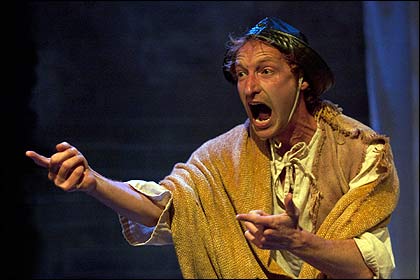
Fast and Loose, A Play for All Seasons
Leebrick gives modern life to A Winters Tale
by Rick Levin
Line for line and play upon play, no artist awes and intimidates like Shakespeare ã such supple poetry, such wry and pungent humor, such humanity, powers of empathy and understanding, all that deep, soulful psychology and gritty politicking, the cosmic wisdom. Timeless stuff. I suspect the man may have been God.
 |
| Tom Wilson in A Winters Tale |
And for that reason, Ive never attended a Shakespeare play without first, at the very least, reading the Cliffs Notes to get an idea of what to expect. I like to warm up before a Shakespeare play, lest I sprain my cerebral cortex trying to keep pace.
Alas, I failed to do this for A Winters Tale, with which I am completely, and embarrassingly, unfamiliar. Oops. As I slouched in my seat anticipating the dimming of the lights, my best guess was that I was in for some sort of comedy, maybe with a spruce of sprites and a wily warlock or two. Intimations of hoarfrost, fair maidens, Elizabethan banjo, a double marriage, country matters. Im a poor player. What Im trying to say is: I was up yon shit creek, verily lacking a paddle.
But serendipity is a funny thing; you cant plan it, and you sure as hell dont see it coming. Not five minutes into Lord Leebricks wonderful new production of A Winters Tale ã and having nary a clue what to expect ã I was completely swept up in the here-and-now of the story. My own ignorance of the play brought it to stunning life, turned it from a rarefied fossil demanding my respect into a living, breathing piece of great theater. The language sang. The suspense was intense. The humor was visceral. Rather than viewing Shakespeare from behind museum glass and nodding with acquired intellectual approval (AIA), I was defenseless ã because unprepared and unprejudiced ã against the immediacy of Shakespeares genius. The play beat with red blood in its veins, raw, human, alive, whatever the opposite of academic is. Modern. Now.
Considered one of the Bards later works (though published in the First Folio), A Winters Tale is an odd beast: It begins ominously, moving toward tragedy, then switches gears with all the genre-bending irreverence of a Korean horror film. Many critics call it one of Shakespeares “problem plays,” because it opens with a disturbingly thorough examination of jealousys evolution, from the almost accidental moment the insidious seed is planted in the brain to the full, destructive blossoming of green-eyed insanity. As the audience watches the venomous hold jealousy takes on King Leontes (William Campbell) ã destroying his friendship with King Polixenes (Timothy McIntosh) and laying waste to his wife Hermione (M. Francine), son Mamillius (Dimitri Bong) and newborn daughter (Perdita, played in the second act by Rose Proctor) ã the atmosphere of doom becomes palpable. The tension is almost too much. Director John Schmor, abetted by an exquisitely minimalist set by designer Jonathon Taylor and the tick-tock sound design of Matthew Romein, does an expert job in stripping Shakespeares language to the bone, giving it the room and slithery pace it needs to unwind effectively on stage.
And then, whammo: The second act opens 16 years later in Bohemia, where the orphaned Perdita, unaware of her royal heritage and raised by an Old Shepherd (David Stuart Bull) and his son, Clown (Tom Wilson), has fallen in love with Polixenes son, Florizel (Andrew Poletto, a dead ringer for Cillian Murphy). Here the play drastically changes tones, becoming a rollicking romantic comedy.
As with The Tempest, thought by most to be Shakespeares final play, A Winters Tale plays fast and loose with the rules ã of narrative, of genre, of faith and disbelief, of Shakespeares own dramatic paradigms. A kind of Anglicized magical realism reigns. There is a feeling of controlled chaos, of Shakespeare tipping his hand and both revealing and reveling in his artistry. The director tinkers brilliantly with this Elizabethan deconstruction; Schmor breaks down the third wall, drawing the audience directly into the story, and he sprinkles the action with deftly modern touches (at one point, Dan Pegoda, playing the neer-do-well pickpocket Autolycus, does an uproarious Bob Dylan impersonation).
Ive always preferred the constricted, constricting dread of plays like Macbeth and Antony and Cleopatra to the wonky, kitchen-sink atmosphere and deus ex machina magic of The Tempest, which feels at once cheap and self-regarding. In A Winters Tale, however, Shakespeares dramatic sleight of hand is more naturally employed; the play is no less loosely stitched than The Tempest, but its humanist gaze and playfulness are unforced and therefore engaging. Hand it to Lord Leebricks crackerjack production, which teases out the plays subtleties and humor with limber charm and a knowing wink. Schmors directorial touch is spot-on, the cast is fantastic and, despite its two and a half hours, the production moves at a gleeful clip ã even in its temporary gloom. All in all, A Winters Tale feels just right for right now, like a spring thaw before summers breeze.